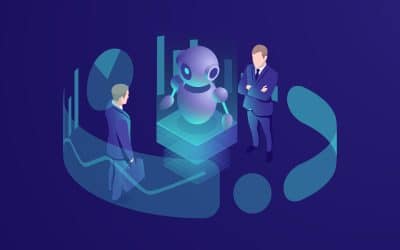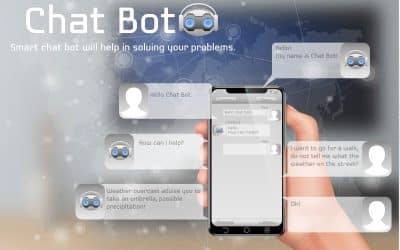In the ever-changing field of AI, which is rapidly evolving (AI), companies and organizations increasingly rely on experts to provide guidance and assistance in the implementation. Two important jobs in this field are AI consultant and AI developer, each with responsibility and skills. While their titles might appear similar, understanding their distinct differences is essential for companies looking to use AI effectively.
AI consultants serve as advisors to strategic decisions, offering suggestions, insights, and advice on how AI technology can be used to address business issues and opportunities. They specialize in analyzing client needs, analyzing data, and forming AI strategies that meet specific goals.
However, AI developers are experts in technical aspects who concentrate on developing and developing AI solutions. They have a deep understanding of programming languages, machine-learning algorithms, and methodologies for software development that allow the development of AI concepts in practical systems and applications.
This article seeks to clarify the differences between AI consultants and AI developers and shed light on their roles, obligations, and contributions toward their respective roles in the AI ecosystem.
Skill Sets and Expertise
AI Consultants and AI developers possess distinctive capabilities and skills that are suited to their respective jobs. AI consultants generally have analytical abilities, strategic thinking capabilities, and business expertise. They excel at solving problems, data analysis, and communicating tech concepts for non-technical people. In addition, they might have experience in specific fields, allowing them to offer specific recommendations and insight.
On the other hand AI developers are adept in programming languages, such as Python, R, or Java and also frameworks and tools that are commonly employed for machine learning as well as AI development, including TensorFlow, PyTorch, or Scikit-learn. They have a thorough understanding of algorithms for machine learning as well as data preprocessing methods and models optimization techniques. Additionally, AI developers possess strong technical skills in software engineering, such as the control of versions, testing and debugging, in order to ensure the durability and the scalability of AI solutions.
Focus Areas and Scope of Work
AI Consultants and AI developers have distinct focus areas of work and responsibilities in AI projects. AI consultants concentrate on understanding the client’s needs as well as analyzing business processes and identifying areas in which AI technology could add value. They work with the stakeholders to identify needs and conduct feasibility studies and create AI strategies that align with organizational goals. Furthermore, AI consultants may assist in selecting a vendor or project planning as well as risk assessments to ensure the success of AI implementations.
On the other hand AI developers are accountable to implement AI solutions that are based on guidelines and strategies laid out by AI consultants. Their tasks include data processing and feature engineering, as well as modeling training, and the integration of AI models into production environments. AI developers work closely with data researchers, software engineers and domain experts to develop and build AI systems that satisfy client needs. They also play a crucial role in diagnosing problems, fine-tuning models and testing solutions by analyzing feedback from the end-users.
Project Involvement and Roles in the Development Lifecycle
AI experts and AI developers are different in terms of types of involvement and responsibilities in the AI development cycle. AI consultants typically participate at the beginning of a project. In this phase, they evaluate business requirements establish project goals and formulate AI strategies. They work with the people involved in the project to collect information and conduct market research and determine the viability in AI implementations. Furthermore, AI consultants may provide advice on data collection, data labelling, as well as procedures for data governance to guarantee the validity and accuracy of the input data used in AI models.
However, AI developers are mostly involved in the design and execution of the project. They rely on the suggestions and strategies suggested in the work of AI consultants and transform them into practical strategies and delivery documents. AI developers are accountable for data processing and model selection hyperparameter tuning, as well as the performance assessment of AI models. They also oversee their integrations of AI solutions into existing systems, design APIs to facilitate model inference and then deploy models to production environments. Through the entire development process, AI developers collaborate with teams from across the functional spectrum to ensure alignment with the timelines of projects as well as the requirements and goals.
Cooperative Dynamics within Teams
AI Consultants and AI developers work closely in multidisciplinary teams to produce efficient AI projects. AI consultants collaborate alongside domain analysts, business analysts and project managers to comprehend client requirements, define the scope of the project, and create AI strategies that align with the business goals. They participate in ongoing sessions and meetings with the participants to collect requirements prioritize tasks and deal with issues throughout the lifecycle of a project. Furthermore, AI consultants provide ongoing support and guidance for AI developers, providing insights into best practices in the industry new trends, possible challenges.
AI developers work with data scientists, machine-learning engineers and software developers to develop AI solutions based on suggestions and strategies provided in the work of AI consultants. They are involved during code reviews, design sprints and meetings to plan sprints in order to ensure that the project is in line with objectives and needs. Furthermore, AI developers engage in discussions on knowledge sharing and technical discussions with teams from across the functional spectrum to share ideas, solve issues, and develop ideas for innovative solutions. By encouraging an environment of communication and collaboration, AI teams can leverage the different perspectives and expertise of their team members to tackle the challenges and make sure that projects succeed.
Problem-Solving Approaches and Methodologies
AI experts and AI developers use a variety of strategies and methods to tackle the challenges of AI projects. AI consultants employ analytical frameworks and strategic planning tools and specific industry knowledge to find opportunities that AI technology could create business value. They conduct thorough studies of trends in the market along with competitive landscapes and customer behaviors to help inform AI strategies and suggestions. Additionally, AI consultants leverage their skills in the analysis of data as well as statistical modeling machine learning to create custom solutions that are tailored to the needs of clients and goals.
However, AI developers apply technical capabilities, coding skills and principles of software engineering to create AI applications in actual situations. They employ programming languages like Python, R, or Java to design algorithms, create prototypes, and then integrate designs into systems in production. Furthermore, AI developers leverage machine learning frameworks and libraries, such as TensorFlow, PyTorch, or Scikit-learn for training, evaluating and optimize AI models. Furthermore, AI developers employ agile methodologies, version control systems, and continuous integration/continuous deployment (CI/CD) pipelines to streamline development processes, iterate on solutions, and deliver high-quality software products. Combining their technical knowledge and industry-leading practices, AI developers can develop robust high-quality, reliable, and effective AI solutions that satisfy client demands and meet or exceed expectations.
Strategic Consultation in contrast to. Technical Implementation
AI consultants concentrate on strategic consulting and provide advice and guidance for companies on how they can utilize AI technology to accomplish their goals and goals. They work with stakeholders to comprehend business needs evaluate opportunities, and create AI strategies that are aligned with corporate goals. AI Consultants conduct market analysis analyses, competitor analysis, study of feasibility to discover possibilities for AI uses and possibilities to create new ideas. They also help companies navigate the regulatory requirements, ethical issues and other obstacles related to AI adoption.
On the other hand AI developers are experts in the technical implementation of AI strategies and suggestions into practical systems and applications. They are accountable for data preparation modeling, algorithm development, model selection as well as system integration. AI developers use programming languages, machine-learning frameworks and software engineering concepts to create AI solutions that meet the client’s specifications and requirements. They work with software engineers, data scientists as well as domain specialists to develop, create, and implement AI systems that satisfy the needs of businesses and provide benefits to all stakeholders.
While AI consultants concentrate on strategic planning that is high-level as well as decision making, AI developers are primarily focused on the implementation and execution of AI projects. Working together, AI consultants and AI developers can make sure the AI initiatives are in line with the business goals, are technically viable, and provide tangible outcomes for companies.
Client Interaction
AI consultants are involved in a lot of interactions with clients, sharing information, suggestions and strategic advice to all stakeholders throughout the duration of the project. They conduct meetings, workshops and presentations in order to gather information, share results, and then discuss findings, and then present AI strategies that are tailored to the client’s requirements. AI consultants utilize storytelling, data visualization, and other methods of communication to explain complicated technical concepts in an easy and easy-to-understand way. They also provide frequent information, updates on the progress and status reports to keep clients updated and involved in the process of making decisions.
Contrary to this, AI developers focus on the delivery of tangible results and solutions to clients via technological implementation and implementation. They work with clients to understand their requirements, define specifications, and solicit feedback on the prototypes and deliverables. AI developers showcase the capabilities and effectiveness in AI systems, respond to technical concerns and issues as well as work with clients to improve and improve solutions. Although AI developers might not be involved in the same level of strategic debate or analysis like AI consultants but they play an important function in delivering value for clients by ensuring the success of AI projects.
Effective client interaction is crucial to both AI consultants as well as AI development teams to guarantee that they are aligned with the client’s needs, expectations and goals. Through fostering the openness of communication, collaboration as well as trust AI specialists can develop solid relationships with their clients and develop effective AI projects that have a positive the business results.
Project Ownership
AI experts and AI developers possess various levels of project responsibility, ownership and accountability for AI projects. AI consultants generally assume an overall strategic responsibility in determining the direction and performance of AI initiatives. They are responsible for setting the scope, goals, and deliverables, in addition to managing expectations of clients as well as budgets, timelines, and deadlines. AI consultants manage the entire duration of the project starting from the initial planning and scope-setting to deployment and implementation, assuring they ensure that AI strategies are implemented effectively and in line with the business objectives.
On the other hand AI developers concentrate on the implementation of the technical aspects and the completion of AI projects, and take ownership of specific tasks, deliverables and milestones. They are accountable for writing code, creating models, and constructing software applications that are compatible with specifications and client demands. AI developers work in teams of different functions for ensuring the AI solutions are robust, reliable and maintainable. Their responsibility is the delivery of top-quality work within the deadlines of projects and deadlines.
Although AI experts and AI developers might have different specializations and areas of expertise, they both play crucial parts in the achievement in AI projects. Through collaboration and using their respective strengths and expertise, AI professionals can deliver powerful solutions that increase innovations and business value.
Deliverable Expectations
AI Consultants AI consultants and AI developers are accountable to deliver various kinds of results and deliverables in AI projects. AI consultants usually produce reports or presentations as well as strategic suggestions that offer insights analysis, guidance, and analysis for clients. The deliverables could include market analyses, opportunity analysis and AI strategies that are customized to the client’s needs and goals. AI consultants employ storytelling, data visualization and other methods of communication to communicate complicated technical concepts in a simple and understandable manner, allowing clients to make informed choices regarding AI adoption and its implementation.
Contrary to this, AI developers focus on developing functional systems, applications and solutions that are able to implement the suggestions and strategies laid out in the work of AI consultants. They are accountable for writing code, creating models, and constructing software applications that comply with the requirements and specifications of the client. AI developers work in collaboration with software engineers, data scientists as well as domain specialists to develop, build, and deploy AI systems that satisfy requirements of the business and bring value to the stakeholders. The outputs could include proof-of-concepts, prototypes and ready-for-production AI systems that can be reliable, scalable and efficient.
In the end, AI consultants and AI developers collaborate to provide complete AI solutions that integrate the strategic perspective of AI with the technical knowledge. By aligning expectations for deliverables with the client’s needs and goals, AI professionals can ensure that AI projects are of real benefits and generate business results.
Adaptability
Both AI consultants as well as AI developers need to be able and able to adapt to shifting project requirements prioritization, constraints, and priorities. AI projects typically involve a variety of complicated challenges, changing technologies, and constantly changing business environments, which require AI professionals to be able to respond rapidly and efficiently to changing conditions. AI consultants need to be able to modify the scope of projects, timelines, and strategies to accommodate changes in information, feedback from stakeholders and market dynamics. They work with clients to find opportunities and obstacles, evaluate the risks, and take informed decisions regarding project direction and the priorities.
Similar to that, AI developers must be flexible in responding to changes in technological requirements, design constraints and challenges in implementation. They collaborate with software engineers, data scientists as well as domain specialists to comprehend the objectives of the project, understand requirements, and address technical issues that occur. AI developers utilize agile methodologies and iterative development methods and constant feedback loops to continuously work on ideas, improve prototypes, and create top-quality software that meets customer requirements and expectations.
All in all, adaptability is vital in order for AI consultants as well as AI developers to manage the challenges and uncertainty of AI projects with ease. Being flexible and responsive to changing requirements, AI professionals can deliver creative solutions that respond to changing requirements of business and create lasting value for their clients.
Learning Curve
In the constantly evolving AI field AI, both AI consultants as well as AI developers have to face long learning curves and try to keep abreast of the most recent advancements in methods, and techniques. AI consultants are required to continuously improve their understanding of AI developments the best practices, as well as industry standards in order to provide their clients with cutting-edge advice and insights. They are involved in continuous professional development by attending seminars, conferences and training sessions to enhance their knowledge in areas like machine learning as well as natural language processing and computer vision.
In the same way, AI developers must continually improve their technical expertise and skills to keep up with advances within AI advancement and research. They spend time learning new programming frameworks, languages and tools, in addition to learning techniques for data processing as well as model training and optimization of performance. AI developers take part in online classes, tutorials and boot camps for coding to increase their expertise in areas like Deep Learning, Reinforcement Learning and cloud computing.
In embracing a culture of continuous learning and training, AI consultants and AI developers can stay ahead the curve and offer new solutions that are able to fulfill the ever-changing demands of both stakeholders and clients. Furthermore, continuous training and development allows AI professionals to adjust to shifting jobs, career paths and trends in the industry to ensure longevity and success in the ever-changing area that is artificial intelligence.
Industry Specialization
AI experts and AI developers can be specialized in particular sectors or industries, and rely on their expertise in specific areas to provide customized solutions that address specific industry problems and opportunities. AI consultants are immersed into the intricacies of various industries like manufacturing, finance, healthcare or retail, and gain profundity into the specific trends of each sector regulations, consumer behavior. They work with clients to pinpoint problems, discover potential opportunities that are not being seen, and then develop AI strategies that create growth and innovation within their respective sectors.
In the same way, AI developers may focus on creating special AI applications and solutions for particular industries or usage cases. They can modify algorithms models, models, as well as software applications to meet the specific demands and needs of clients working in areas like energy, agriculture transportation, and education. AI developers work closely with domain experts and subject matter experts and the end-users to better understand specific industry issues, test the solutions and assure compliance with specific standards and regulations for the sector.
With the help of specialization in specific areas, AI consultants and AI developers can gain deep domain knowledge, build credibility with clients and offer solutions specific to the needs of various sectors. Additionally, the industry expertise allows AI experts to anticipate new trends, recognize specific opportunities and establish themselves as reliable partners and advisors within certain vertical markets.
Project Management
The management of projects plays a crucial part in the achievement for AI initiatives, and requires efficient monitoring and coordination with all the individuals. AI consultants are typically accountable for tasks related to project management like planning, scoping and distributing resources and in order to ensure the AI projects are completed efficiently and efficiently. They design timelines for projects as well as set milestones and monitor progress against deliverables, while identifying the risks and challenges and adopting mitigation strategies when necessary. AI consultants also aid in the communication and collaboration between teams from different departments, ensuring that everyone is on the same page with the goals and objectives of the project.
AI developers can also be involved in managing project tasks, specifically in tasks that require coordination, leadership and supervision for technical groups. They work in conjunction with software engineers, data scientists and other stakeholders to determine the requirements for projects, determine priorities, and manage resources efficiently. AI developers employ methodologies and tools for managing projects like Agile, Scrum, or Kanban to simplify the development process as well as manage workflows and ensure the timely the delivery to customers of AI solutions. They also regularly communicate with their clients and other stakeholders to update them, collect comments, as well as address issues throughout the life of the project.
In embracing the concepts of project management and methods, AI consultants and AI developers can produce AI projects that are in line with the expectations of clients, stick to the timelines of projects, and deliver the goals. Furthermore, effective project management allows AI experts to manage risk, solve issues and continuously improve their companies.
Innovation Contribution
AI advisors and AI developers aid in the process of innovation in a variety of ways in different ways, by AI consultants focusing on ideas development, strategic plan and thought leadership, whereas AI developers concentrate on the implementation, technical execution, and delivery of novel solutions. AI consultants leverage their knowledge in the analysis of data market research, data analysis, and industry trends to pinpoint emerging opportunities, identify new applications and create new AI strategies that increase the business and create competitive advantages. They work with clients to discover new concepts, test cutting-edge technology and challenge the limits of what’s possible using AI.
On the other hand AI developers play an essential part in bringing new concepts to life through the technical execution and implementation. They transform conceptual concepts prototypes, proof-of-concepts, and prototypes into practical systems and applications using their knowledge of programming machines, machine learning and software engineering, to design cutting-edge AI solutions. AI developers play around with various methods, algorithms and techniques to enhance performance, increase usability and create user-centric experiences. Also, AI developers contribute the development of technology by investigating new libraries, tools and frameworks, as well as incorporate the most recent advances of AI studies into their research.
In fostering a culture that encourages collaboration and innovation, AI consultants and AI developers can encourage constant improvement, creativity and ad hoc experimentation within their workplaces. Combining their diverse expertise as well as perspectives AI specialists can come up with innovative solutions to tackle complex issues and create new opportunities to grow and innovate.
Risk Assessment
Risk assessment is an essential element of AI projects. It requires AI consultants as well as AI developers to recognize potential risks, analyze their effects, as well as formulate strategies to reduce or manage them efficiently. AI consultants conduct thorough risk assessments, looking at factors like data quality, accuracy of the model as well as regulatory compliance and ethical considerations to pinpoint possible risks and obstacles which could impact the project’s success. They collaborate closely with their clients and other stakeholders to devise risk mitigation strategies and establish contingency plans and make sure they ensure that AI projects are carried out in a way that minimizes risk and maximizes the benefits.
In the same way, AI developers play a crucial role in risk assessments by identifying the technical risk, dependencies, and limitations that could affect the deployment and implementation of AI solutions. They conduct extensive tests, validations and testing of AI models and systems in order to detect the possibility of issues like bias, overfitting, or algorithmic mistakes. AI developers work with data scientists, software engineers along with domain-specific experts, to tackle technical issues, solve problems and make sure that AI solutions are in line with quality standards and performance requirements.
Through proactively taking stock of and managing risks, AI consultants and AI developers can increase the probability of project success, limit unanticipated setbacks, and create confidence among the stakeholders. Furthermore, risk assessment allows AI experts to predict obstacles as well as develop contingency plans and adapt to the changing environment and ensure that AI projects yield value and deliver the outcomes you want.
Team Collaboration
Collaboration between teams is crucial to the successful implementation of AI projects. It requires AI experts as well as AI developers to collaborate with cross-functional teams, and collaborate together with other experts. AI consultants work with domain experts, business analysts and project managers to collect the requirements, establish project scope and formulate AI strategies that are aligned with the objectives and goals of the organization. They aid in communication and collaboration between all stakeholders, making sure that everyone is in sync with the project’s goals and objectives.
Similar to that, AI developers collaborate with data researchers, software engineers and other technical experts to develop, design and then deploy AI solutions that satisfy the client’s demands and specs. They take part in code reviews, design sprints and sprint planning sessions in order to make sure they are ensuring that AI projects are implemented efficiently and efficiently. AI developers also work with end-users and clients to collect feedback, verify solutions, and tackle technical issues when they arise.
In fostering a culture that encourages interaction and cooperation, AI consultants and AI developers can benefit from the varied knowledge and perspectives of the team members to create effective AI projects that generate innovation and business value. Furthermore, effective team collaboration can allow AI experts to share their information, best practices, or lessons learnt, creating the culture that is constantly improving and growing within their companies.
Client Education
Education of the client is a crucial component of AI consulting. It is essential for AI consultants to equip users with knowledge and knowledge of AI techniques, methodologies, and the best methods. AI consultants inform clients of the benefits and potential risks from AI adoption, and help them make informed decisions when it comes to incorporating AI to their own business plans. They offer workshops, training, and seminars that help customers comprehend AI concepts as well as the implications for their companies.
In the same way, AI developers play a role in the education of clients by offering guidance, assistance and education on the operation and use for AI solutions. They show the capabilities and abilities of AI systems, show how to interpret results and provide guidance on how to utilize AI tools and software efficiently. AI developers also work with clients to create documents, user guides and training tools that aid in the transfer of knowledge and help users to make the most of their AI investment.
In empowering stakeholders with information and knowledge of AI technology, AI consultants and AI developers can increase confidence, trust and confidence regarding AI solutions. In addition, it helps businesses to make educated decisions regarding AI use, investments as well as implementation. This ultimately resulting in the business to success and fostering technological innovation.
Outcome Evaluation
The measurement of the success in AI project is a challenge that requires AI advisors along with AI developers to establish and monitor the key metrics of performance (KPIs) and success metrics that are aligned with the project’s goals and objectives. AI consultants work with clients to define tangible and quantifiable results that include higher efficiency, more revenue, or improved customer satisfaction. These outcomes show the effect on the impact of AI initiatives on the business’s performance. They design frameworks, methodologies and tools to collect analysis, reporting, and analyzing details on the project’s progress and the results.
In the same way, AI developers are responsible in implementing tracking methods, monitoring tools as well as analytics-related dashboards to collect relevant data and metrics relating with AI solutions. They work with software engineers, data scientists as well as other stakeholders to develop and establish performance measurement systems that offer information on the efficiency and effectiveness of AI algorithms and models. AI creators also carry out periodic reviews, evaluations review of AI solutions to determine areas to improve and optimize.
By assessing the success of projects and evaluating their results, AI consultants and AI developers can prove the worth and the impact from AI projects on the performance of business and satisfaction of stakeholder. Additionally, evaluation of outcomes helps organisations to determine the lessons learned, the best practices and areas to invest in and development in AI.
Regulatory Compliance
The compliance of regulatory agencies is a crucial factor when it comes to AI projects, which requires AI consultants as well as AI developers to make sure that AI solutions comply with relevant laws regulations, laws, and industry standards. AI consultants conduct thorough reviews of the regulations, including privacy, data protection and security laws, to determine problems and compliance risks. They collaborate with experts in law as well as compliance officers along with regulatory bodies to design procedures and strategies to ensure that AI projects meet the requirements of relevant law and regulation.
In the same way, AI developers are responsible for the implementation of security measures, technical controls and measures that ensure the compliance of regulatory authorities within AI solutions. They develop and implement data handling procedures such as encryption techniques and access controls to safeguard sensitive data and guarantee confidentiality and safety. AI developers also work with compliance teams in conducting risk assessments, audits and audits of AI systems to confirm the compliance of the regulations.
By prioritizing compliance with regulatory standards, AI consultants and AI developers can minimize risks to reputation and legality and build trust with the people who work with them, and establish an environment that encourages responsible AI creation and deployment. Additionally, adherence to regulations allows companies to gain access to new markets, draw customers, and distinguish themselves from their competitors in a highly regulated market.
Budget Allocation
A well-planned budget allocation is crucial to the achievement of AI projects. This requires AI consultants as well as AI developers to allocate, plan resources efficiently to ensure that projects are successful within budget limitations. AI consultants work with clients to create realistic estimates, budgets along with cost estimates to support AI initiatives based upon project dimensions complexity, requirements, and scope. They conduct cost-benefit analysis as well as returns to investment (ROI) analyses and risk assessments to guide budgetary decisions and allocate resources.
Similar to that, AI developers are responsible for coordinating timelines, budgets as well as resources, to make sure AI projects are completed in time and within budget. They work with project managers, finance teams and other key stakeholders to keep track of project expenses, monitor expenditures and discover ways to reduce costs and efficiency. AI developers additionally prioritize tasks, assign resources and manage workloads to increase efficiency and productivity throughout the duration of the project.
By efficiently managing budget allocations, AI consultants and AI developers can maximize the use of resources as well as reduce financial risks and ensure the success of AI projects that are in line with client expectations and goals. Additionally, budget management allows companies to allocate resources in a strategic manner to prioritize investments, as well as be able to sustain long-term growth and sustainability through AI adoption and in the development of AI.
Ethical Considerations
The importance of ethical considerations is paramount when it comes to AI development and requires AI consultants as well as AI developers to tackle ethical concerns that concern transparency, fairness, accountability, bias, and fairness within AI systems. AI consultants conduct ethics assessments, ethical impact analysis, and audits of ethics to determine the possible risks and concerns that could arise from AI projects. They collaborate with ethicists, decision-makers, and others to create ethical guidelines, principles, frameworks, and guidelines that govern the responsible AI creation and deployment.
In the same way, AI developers integrate ethical concerns in the design, development, and deployment of AI solutions. They employ fairness-aware algorithms, bias detection methods, and explanation tools that help increase transparency and accountability within AI systems. AI developers also work with teams from different disciplines to address ethical issues regarding data privacy and algorithmic bias, as well as the impact on society, ensuring that AI solutions are designed and implemented in a way that adheres to ethical principles and values.
Focusing on ethical issues can help AI consultants and developers reduce risks, establish trust, and increase the public’s acceptance of AI technology. Furthermore, the ethical aspect of AI development allows organizations to show their dedication to responsible development, social responsibility, and ethics-based leadership in the digital age.
Knowledge Sharing
Knowledge sharing is crucial to stimulating innovation and creating collaboration in the AI field. This requires AI consultants and programmers to communicate their knowledge of the latest research, knowledge, and best practices with their peers, clients, and the general public. AI Consultants share their expertise and experiences through workshops, conferences, and papers, presenting research findings, case studies, and ideas on the latest trends and advancements in AI.
In the same way, AI developers contribute to knowledge sharing by participating in technical forums, online communities, and open-source projects where they share tools, code, and other tools with other developers and researchers. AI developers also help to share knowledge through blog posts, tutorials, and GitHub repositories, where they share their experiences, learnings, and best practices for AI development.
Through the promotion of knowledge sharing, AI experts and developers can speed up the pace of innovation, ensure continuous improvement, and establish an environment of learning and collaboration within their own organizations and the wider AI community. Furthermore, knowledge sharing allows organizations to tap into collective expertise, address common problems, and open new avenues for growth and development in AI.
Future Trends
The ability to anticipate trends in the future is vital to remaining ahead of the latest AI software developments in the developing artificial intelligence field. This requires AI consultants and developers to keep track of new technologies, breakthroughs in research, and market dynamics that will shape how we develop AI. AI consultants perform horizon scanning, trend analysis, and scenario planning to determine emerging trends and advancements in AI that could affect operational and business strategies.
Similarly, AI developers keep abreast of the latest developments in AI research and development as well as applications by staying up-to-date with the latest algorithms, techniques, and tools that can develop innovative AI solutions. They are also involved in AI workshops, conferences, and webinars, where they can learn about the latest research and advancements in fields like the deep learning process, reinforcement learning, and natural processing of language.
In keeping abreast of the latest trends and advancements regarding AI, AI consultants and developers can identify opportunities, obstacles, and disruptions within the AI landscape. This allows organizations to be flexible and innovative in response to shifting market dynamics and technological advances. Furthermore, future trend analysis allows organizations to establish themselves as innovators and leaders in the ever-changing artificial intelligence field.
Continuous Improvement
Continuous improvement is the main concept of AI development. It requires AI consultants as well as AI developers to continually improve strategies and methods to increase performance efficiency, efficacy, and efficiency over-time. AI consultants review their projects after the project, conduct lessons learned sessions and retrospectives to pinpoint improvement areas, and optimize AI methods and strategies.
Similarly, AI developers engage in continuous improvement through conducting reviews of code, performing assessments, and quality evaluations to discover inefficiencies, bugs, and potential for improvement in AI solutions. They focus on reducing technical debt,,, refactoring, and automation to simplify development workflows, and improve the quality of code and maintainability.
By embracing a mindset that is constantly improving, AI consultants and AI developers can spur advancement, boost productivity, and offer top-quality AI solutions that meet customer requirements and expectations. Furthermore, continuous improvement allows businesses to be able to respond to changes in technological advancements, market conditions and demands of the customer which ensures long-term success as well as longevity with regards to AI design and development.
Data Governance
Data governance is crucial to AI projects, which requires AI consultants as well as AI developers to set up procedures, policies and controls that guarantee the integrity, quality and accuracy of the data utilized for AI algorithms and models. AI consultants work with privacy officers, data stewards and teams of compliance to create data governance structures and data management policies and data access control policies that regulate the storage, collection and usage of data within AI projects.
In the same way, AI developers implement data governance techniques including the data profiler, cleansing and masking data to ensure that data utilized to build AI models is precise and reliable. It is also compliant to regulatory specifications. They employ encryption methods as well as access control and audit trails to protect sensitive data as well as guarantee the privacy of data and security throughout the AI project’s lifespan.
By prioritizing the governance of data, AI consultants and AI developers can minimize the risks associated with data while ensuring the integrity and quality of data and establish trust with clients and other stakeholders. Furthermore the effective use of data governance allows businesses to make use of data assets in a responsible, ethical way and securely to help drive growth and innovation as well as business performance.
Scalability
Scalability is an essential factor when it comes to AI development, which requires AI consultants as well as AI development company to develop AI solutions that can handle growing volumes of data, users and transactions over the course of time. AI consultants work with engineers, architects, as well as business analysts, to design platforms, architectures and infrastructures that can enable the expansion and growth of AI projects.
In the same way, AI developers implement scalable design patterns as well as distributed computing techniques and cloud-native solutions that allow AI systems to grow vertically and horizontally to keep up with the increasing requirements. They make use of technology such as microservices, containerization, and serverless computing to develop robust auto-scaling, elastic, and flexible AI applications that can deal with the peaks in workload and user traffic.
With the help of design for scalability, AI consultants and AI developers can ensure the future of AI projects, decrease costs and eliminate disruptions as companies expand and develop. Furthermore it is true that scaleable AI solutions can help organizations discover new opportunities, gain entry into new markets and increase growth and innovation in the modern economy.
User Experience (UX) Design
UX (UX) designing is vital to the achievement in AI projects, which requires AI experts as well as AI developers to consider accessibility, usability, and involvement in the development and design of AI applications and interfaces. AI consultants work in conjunction with UX designers Human-computer interaction specialists and usability experts to carry out user research, personas creation and user journey mapping that guide the development of user-friendly and intuitive AI solutions.
In the same way, AI developers implement UX design principles like user-friendly design, intuitive navigation and a variety of interactive feedback features that increase the user experience and satisfaction for AI applications. They work together with graphic designers and UX/UI developers and front-end developers in order to develop stunning and easy-to-use user interfaces that deliver smooth and enjoyable user experience.
Prioritizing UX layout, AI consultants and AI developers can increase the satisfaction of users, their retention and acceptance of AI applications, which can increase results for business and competitive advantages. Furthermore, improved user experiences allow organizations to stand out in the market and develop strong customer relationships that are built on trust and loyal.
Performance Optimization
Optimization of performance is crucial for AI projects, which requires AI consultants as well as AI programmers to improve workflows, algorithms and infrastructures in order to increase efficiency performance, speed, and scaling in AI solutions. AI consultants work with engineers, data scientists and system designers to pinpoint performance bottlenecks, improve algorithms, and fine tune parameters to increase performance and accuracy of AI models.
Similar to that, AI developers implement performance optimization techniques like algorithms the use of parallelization and hardware acceleration and caching to improve the effectiveness and scalability in AI applications. They work together with engineers from infrastructure, DevOps teams, and cloud providers to improve the allocation of resources, provisioning, and utilization to ensure that they meet the performance standards as well as service level agreements (SLAs).
Through prioritizing performance optimization, AI consultants and AI developers can create AI solutions that are able to meet your performance requirements, expand to manage increasing workloads and provide real-time insight and responses. Furthermore, optimizing performance allows businesses to maximize the impact and value from AI projects, thereby accelerating productivity, innovation and competitiveness in a digital era.
Explainability and Interpretability
Interpretability and explainability are crucial for AI projects. They require AI consultants as well as AI developers to develop and build AI products that can be comprehensible, transparent and understandable by both users and stakeholders. AI consultants work with ethicists, domain experts and regulators to formulate guidelines as well as standards and best practices for explaining AI (XAI) which promote transparency and confidence in AI systems.
Similar to that, AI developers implement techniques such as model explanation ability and feature importance analysis and visualization of decision trees to let users understand and understand the behavior and choices in AI models. They work with UX designers as well as data scientists and experts in domains to develop user-friendly and informative interfaces that give clarifications, insight and context for users regarding AI predictions and suggestions.
In focusing on explainability and interpretability, AI consultants and AI developers can establish confidence, trust and acceptability of AI solutions by users and other stakeholders. Additionally, transparent and understandable AI allows organizations to be in compliance with the requirements of regulatory agencies, ethical guidelines, and expectations of users and encourage responsible AI creation and deployment within society.
Model Monitoring and Maintenance
Monitoring and maintenance of models are crucial aspects of AI projects. They require AI consultants as well as AI developers to develop procedures and systems for monitoring the state of their models, updating them, and maintaining AI model and system that ensure reliability and long-term performance. AI consultants work with engineers, data scientists and operations teams to create monitoring systems, alerting mechanisms and performance metrics that monitor their performance AI models in the production environment.
In the same way, AI developers implement model monitoring tools, logging mechanisms and algorithms to detect anomalies, which allow constant monitoring of AI models for degradation, drift performance, and drift. They work with DevOps teams as well as data engineers and quality assurance experts to establish automated testing and validation pipelines to ensure that AI models are accurate as well as robust and current throughout the course of.
By prioritizing monitoring of models and maintaining, AI experts as well as AI developers can identify and fix issues with performance, reduce downtime and increase the effectiveness and efficiency that comes from AI solutions. Furthermore, continual monitoring and maintenance allow businesses to be able to respond to changes in patterns of data distribution, user behavior and business needs and ensure that AI models are relevant and effective in ever-changing and changing environments.
Collaboration with the Regulatory Bodies
The collaboration with regulators is crucial for AI projects. This requires AI consultants as well as AI developers to communicate with policymakers, regulators, along industry groups to make sure that they are in compliance with the relevant laws, regulations, standards, and laws for the development and use and deployment of AI solutions. AI consultants collaborate closely with experts in law, compliance officers and the regulatory affairs team to understand and interpret regulations and their implications for AI projects.
Similar to that, AI developers collaborate with compliance experts, privacy officers as well as data security authorities, to make sure that AI solutions adhere to data security, privacy ethics, and privacy standards. They employ technological controls, encryption techniques, and access control measures that secure sensitive information and ensure compliance with regulations throughout the AI project’s lifecycle.
Through collaboration with regulatory bodies, AI consultants and AI developers can minimize the risk of reputational and legal issues as well as build trust with people in the field, and promote an environment that encourages responsible AI creation and deployment. Furthermore, collaborating with regulators allows organizations to remain informed of the changing regulations and anticipate compliance issues and tackle them in a proactive manner when working on AI projects.
Disaster Recovery and Business Continuity Planning
Business continuity and disaster recovery planning are essential for AI projects. This requires AI consultants as well as AI developers to create and implement strategies, processes and systems to ensure the durability and reliability in AI strategies in event of interruptions, failures or natural disasters. AI consultants work with teams of risk management, IT professionals, and business managers to perform risk assessments, pinpoint the potential risks, and design plans for contingency and recovery for AI projects.
In the same way, AI developers implement disaster recovery systems such as failover systems,, and redundancy systems that guarantee the availability and security for AI strategies in the eventuality of system failures or data breaches, or natural catastrophes. They create and deploy resilient systems as well as distributed systems and backup solutions that limit the time between downtime and data loss, and allow rapid recovery and restoration in the case of AI services.
By prioritizing disaster recovery as well as the business continuity plan, AI consultants and AI developers can minimize operational risks, reduce disruptions, and increase the reliability and resilience for AI solutions in dynamic and uncertain environments. Additionally, a disaster recovery plan helps organizations maintain the continuity of their business, safeguard the trust of customers and secure their brand reputation during unexpected circumstances or emergency.
Performance Monitoring and Optimization
Monitoring and optimization of performance is crucial for AI projects. This requires AI consultants as well as AI developers to continually examine, monitor and optimize efficiency of AI algorithms, models and systems in order to increase the efficiency of and efficacy. AI consultants work with engineers, data scientists and operations teams to define performance metrics, benchmarks and KPIs to track the effectiveness of AI solutions in relation to business goals and the expectations of users.
Similar to that, AI developers implement performance monitoring tools, logging mechanisms and analytics dashboards that offer insight into the behaviour and efficiency of AI models in real-world environments. They study performance data, spot the bottlenecks, and apply optimization strategies like tuning algorithms, caching and parallelization to improve the speed, scalability, as well as the utilization of resources by AI solutions.
By prioritizing monitoring performance and optimizing, AI experts or AI developers can pinpoint and resolve issues with performance, increase the satisfaction of users, as well as increase the competitiveness and value of business. Additionally, continuous optimization of performance allows organizations to remain ahead of the game as they adapt to the changing market conditions and offer AI solutions that can meet the changing demands of users and their expectations.
Cross-Platform Compatibility
Cross-platform compatibility is crucial for AI projects. It requires AI consultants as well as AI developers to develop and build AI solutions that can be interoperable and compatible across various platforms, devices and platforms. AI consultants work together with UX designers as well as system architects and engineers to establish the requirements for platforms, compatibility standards and deployment strategies that guarantee the seamless interoperability and integration for AI solutions.
Similar to that, AI developers implement cross-platform development frameworks, APIs and standards that permit AI solutions to be run on a variety of software and hardware platforms, including mobile devices, desktops as well as cloud environments. They develop APIs, SDKs, as well as integration tools that permit third-party developers to develop and modify AI solutions to suit specific use scenarios and platforms.
By focusing on cross-platform compatibility, AI advisors as well as AI developers can increase access, reach and effectiveness of AI solutions that reach users across a variety of platforms, devices and platforms. Additionally, cross-platform compatibility lets companies to ensure the future of AI projects, adjust to changing technologies, and take advantage of new opportunities in the marketplace of digital.
Stakeholder Engagement and Communication
Communication and stakeholder engagement is essential for the successful implementation of AI projects. It is essential for AI experts along with AI developers to create clear channels for communication as well as foster collaboration between the various stakeholders, such as customers, users and members of the project team. AI consultants organize meetings with stakeholder’s sessions, workshops, and feedback sessions to collect needs, coordinate expectations, and inform the progress of the project and its milestones.
In the same way, AI developers engage with users through regular updates, demonstrations and critiques of AI solutions, seeking feedback and addressing issues in order to make sure that their final solution will meet the requirements of the stakeholders. They work along with the project manager, analysts and communication specialists to design communications schedules, progress reports and other documentation to keep the people informed and involved throughout the lifecycle of the project.
In focusing on communications and engagement with stakeholders, AI consultants and AI developers can increase confidence, trust and collaboration with stakeholders, which creates the culture of accountability and collaboration that is the foundation for achievement and success of AI projects. Additionally, effective communication helps organisations to control expectations, tackle issues in a timely manner, and provide AI solutions that satisfy the expectations of stakeholders and goals for business.
Talent Development and Training
Training and development of talent are vital to develop a competent workforce that can drive the pace of innovation and high-quality AI design and application. AI experts as well as AI developer invest in education programs workshops, certification, and courses that improve technical skills as well as domain knowledge as well as expertise in AI methods, technologies and best methods.
Additionally, companies offer opportunities for training on the job as well as mentorship and professional development. These opportunities allow AI professionals to improve their techniques, acquire knowledge from experienced practitioners, and remain up-to-date with the latest developments on AI application and research. They encourage the continuous development of their skills and knowledge through online resources, conferences or networking occasions that help AI professionals to increase their expertise and knowledge in areas like deep learning, machine learning and natural processing of language.
Through investing in the development of talent and education, companies can create an extremely skilled and flexible workforce that can drive creativity, innovation, and expansion in AI application and adoption. Additionally, the process of developing talent allows businesses to retain and attract top talent, build an environment that encourages excellence and learning and establish themselves as pioneers and leaders in the fast developing area of AI.
Regulatory Compliance
The need for regulatory compliance is crucial to AI projects, and requires AI consultants as well as AI creators to make sure that AI solutions adhere to relevant laws regulations, laws and ethical standards that govern security, privacy and fairness. AI consultants work in conjunction with experts in law as well as compliance officers and regulators to conduct regulatory reviews identify compliance requirements, and devise strategies to ensure that AI projects comply with ethical and legal standards.
Similar to that, AI developers implement technical controls that include encryption methods, as well as access controls that safeguard sensitive information as well as ensure that they are in compliance with the regulatory standards throughout the AI project’s life cycle. They work in conjunction with compliance specialists’ privacy officers, compliance specialists and authorities responsible for protecting data to perform audits, risk assessments and audits of AI systems to confirm conformance with the regulations.
By prioritizing compliance with regulatory standards, AI consultants and AI developers can minimize the risk of reputation and legal issues and build trust with who are involved, and create an environment that encourages responsible AI creation and deployment. Furthermore, compliance with the regulations allows companies to tap into new markets, draw customers, and stand out from their competition in a highly regulated market.
Continuous Learning and Improvement
Continuous learning and continuous improvement are essential to drive the pace of innovation and excellence within AI design and application. AI experts and AI developers adopt a mindset of growth, looking for new opportunities for learning through experimentation, adaptation, and learning that allow them to remain ahead of the game in the constantly developing domain of artificial intelligence.
Additionally, they encourage a culture of continual learning and improvement through providing support, resources and encouragement to AI professionals to seek out learning opportunities, explore new technologies, and work with their peers on exciting projects. They also recognize and reward those and teams who show an interest in learning and excel on AI design and application.
Through the continuous learning and improvement process, AI consultants and AI developers can lead advancement, boost productivity, and offer top-quality AI solutions that satisfy client expectations and goals. Additionally, a system of continuous learning helps companies to be able to respond to changes in circumstances in the market, technological advances and demands of the customer which ensures long-term success as well as longevity with regards to AI creation and implementation.
The Key Takeaway
In the end, selecting the most appropriate custom AI development firm is an important decision that could significantly affect the outcome of your project. When you consider factors like knowledge, experience, expertise, communications, flexibility, and costs, you are able to make an informed choice that is in line with your company’s goals and demands.
Be sure to conduct a thorough investigation ask, pertinent questions, and examine the history of the company as well as its reputation prior to making a choice. Also, look for those who value transparency, cooperation and customer satisfaction since these are the essential elements to an effective collaboration.
If you choose an experienced and trustworthy custom software development firm you will be able to ensure prompt delivery of top-quality custom-designed solutions that will drive innovation efficiency, growth, and efficiency for your company.











